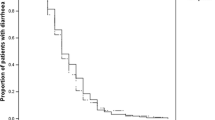Abstract
A 59-year-old man with the diagnosis of endocarditis of the mitral valve due to Streptococcus mitis was treated with penicillin G, gentamicin, and later with clindamycin as inpatient for 3 weeks. Thereafter outpatient therapy with parenteral teicoplanin 3 × per week was initiated. After 17 days of teicoplanin treatment he developed severe diarrhea, and stool samples were positive for Clostridium difficile toxin. In addition to the ongoing parenteral therapy with teicoplanin, oral teicoplanin was administered. On the third day of this regimen the diarrhea and other disabling symptoms subsided, and test results for C. difficile toxin became negative. Oral teicoplanin was continued for 10 days and cleared C. difficile effectively after treatment as assessed by consecutive stool cultures (until 60 days thereafter). The parenteral administration of teicoplanin could not prevent the onset of C. difficile associated diarrhea in this patient, who previously had been treated with clindamycin. Thus, the administration of parenteral teicoplanin does not seem to be a treatment option for C. difficile associated diarrhea in patients in which oral therapy is not possible.
Similar content being viewed by others
References
Ambrose NS, Johnson M, Burdon DW, Keighley MP (1985) The influence of single dose intravenous antibiotics on faecal flora and emergence of Clostridium difficile. J Antimicrob Chemother 15:319–326
Bartlett JG (1984) Treatment of antibiotic associated pseudomembraneous colitis. Rev Infect Dis 6:5235–241
Bartlett JG (1992) Clostridium difficile associated diarrhea and colitis. In: Gorbach SL, Bartlett JG, Blacklow NR (ed) Infectious diseases. Saunders, Philadelphia, pp 612–617
Bolton RP, Culshaw MA (1986) Faecal metronidazole concentrations during oral and intravenous therapy for antibiotic associated colitis due to Clostridium difficile. Gut 27:1169–1172
Borriello SP (1990) The influence of the normal flora on Clostridium colonisation of the gut. Ann Med 22:61–67
Colarian J (1988) Clostridium difficile colitis following antiviral therapy in the acquired immunodeficiency syndrome. Am J Med 84:1081
de Lalla F, Nicolin R, Rinaldi E, Scarpellini P, Rigoli R, Manfrin V, Tramarin A (1992) Prospective study of oral teicoplanin versus oral vancomycin for therapy of pseudomembrancous colitis and Clostridium difficile associated diarrhea. Antimicrob Agent Chemother 36:2192–2196
Donta ST, Lamps GM, Summers RW, Wilkins TD (1980) Cephalosporin associated colitis and Clostridium difficile. Arch Intern Med 140:574–577
Fainstein V, Bodey GP, Fekety R. (1981) Relapsing pseudomembraneous colitis associated with cancer chemotherapy. J Infect Dis 143:865
George WL (1984) Antimicrobial agent associated colitis and diarrhea: historical background and clinical perspectives. Rev Infect Dis 6 [Suppl 1]: 5208–5213
George WL, Rolfe RD, Sutter VL, Finegold SM (1979) Diarrhea and colitis associated with antimicrobial therapy in men and animals. Am J Clin Nutr 32:205–207
George WL, Rolfe RD, Finegold SM (1980) Treatment and prevention of antimicrobial agent associated colitis and diarrhea. Gastrenterology 79:366–372
Guzman R, Kirkpatrick J, Rorward K, Lim F (1988) Failure of parenteral metronidazole in the treatment of pseudomembraneous colitis. J Infect Dis 158:1146
Kelly CP, LaMont JT (1993) Treatment of Clostridium difficile diarrhea and colitis. In: Wolfe MW (ed) Gastrointestinal pharmacotherapy. Saunders, Philadelphia, pp 199–212
Kelly CP, Pothoulakis C, LaMont JT (1994) Clostridium difficile colitis. N Engl J Med 330:257–262
Kleinfeld DI, Sharpe RJ, Donta ST (1988) Parenteral therapy for antibiotic-associated colitis. J Infect Dis 157:389
Knapp FC, Owens M, Crocker CI (1993) Clostridium difficile: clinical disease and diagnosis. Clin Microbiol Rev 6:251–265
Kropec A, Daschner FD (1991) Penetration into tissues of various drugs active against gram-positive bacteria. J Antimicrob Chemother 27:9–15
Mollby R, Aronsson B, Nord CE (1985) Pathogenesis and diagnosis of Clostridium difficile enterocolitis. Scand J Infect Dis 46 [Suppl 1]:47–56
Peterson LR, Gerding DN (1990) Antimicrobial agents in Clostridium difficile associated intestinal disease. In: Rambaud JC, Ducluzeau R (eds) Clostridium difficile et pathologie intestinale: Clostridium difficile associated intestinal diseases. Springer, Berlin Heidelberg New York, pp 115–127
Presterl E, Graninger W, Georgopoulos A (1993) The efficacy of teicoplanin in the treatment of endocarditis caused by gram-positive bacteria. J Antimicrob Ther 31:755–766
Teasely DG, Gerding DN, Olson MM (1983) Prospective randomised trial of metronidazole versus vancomycin for treatment of Clostridium difficile associated diarrhea and colitis. Lancet II:1043–1046
Tedesco FJ (1982) Pseudomembraneous colitis: pathogenesis and therapy. Med Clin North Am 66:655–664
Author information
Authors and Affiliations
Rights and permissions
About this article
Cite this article
Wenisch, C., Etzersdorfer, E., Breyer, S. et al. Intravenous teicoplanin does not prevent Clostridium difficile associated diarrhea. Clin Investig 72, 922–924 (1994). https://doi.org/10.1007/BF00190753
Received:
Accepted:
Issue Date:
DOI: https://doi.org/10.1007/BF00190753




